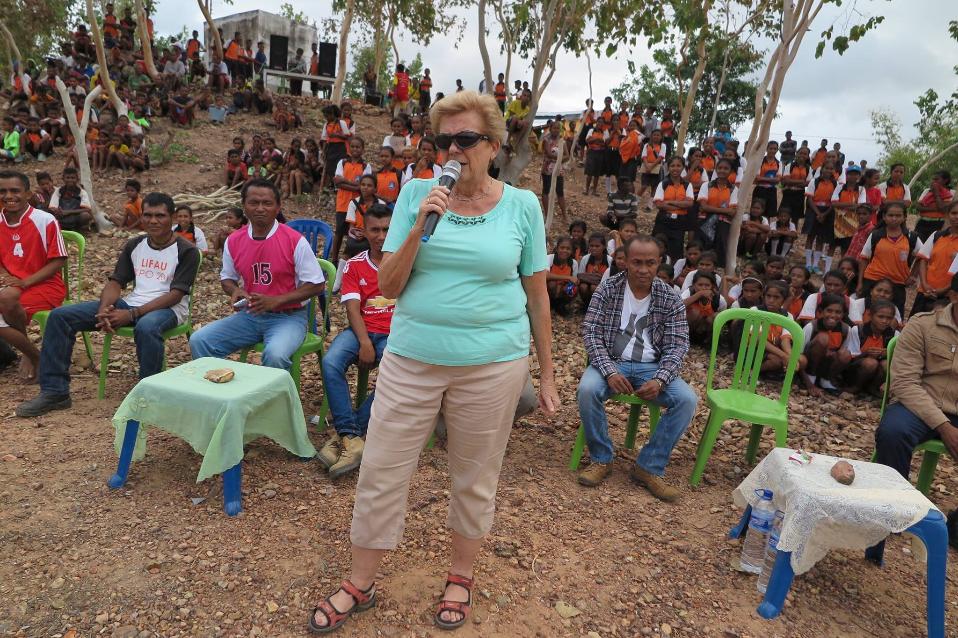August 18 - 24, 2019: Issue 417
Judith Charnaud
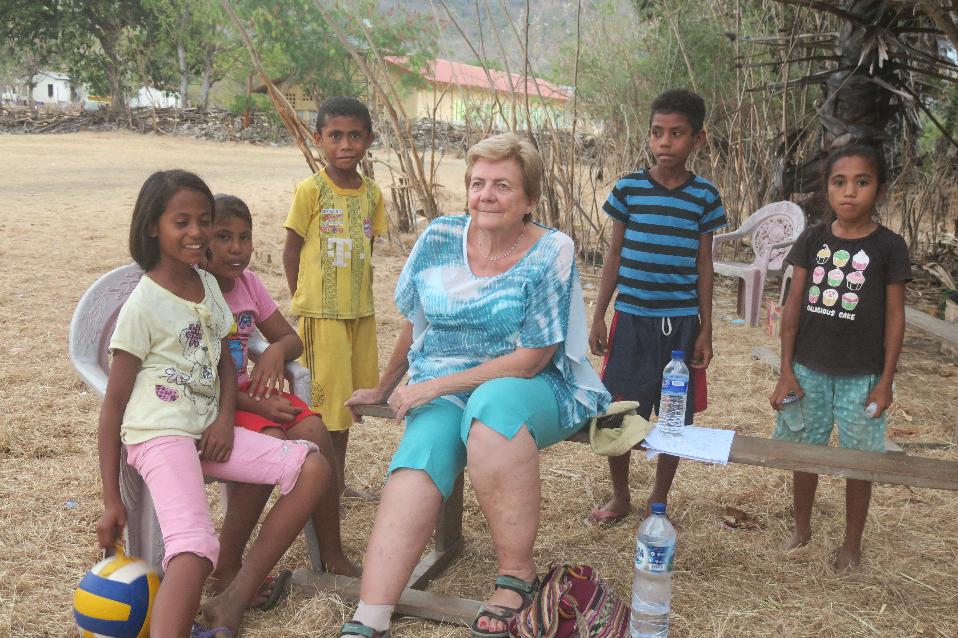
Warriewood resident Judy has had an interesting and varied career including designing and implementing school and community education programs, working as a geologist with a large multi-national mining company, senior secondary science teaching and geology coordinator, costume maker for school musicals and Rock eisteddfods, community volunteer and bush regeneration work.
Travel to places such as India, Afghanistan, Turkey, Iran and South America and outback Australia really broadened her mind then marriage and two children put a stop to her wanderlust for a while. In 1999, needing a break from teaching, Judy decided to volunteer with OzGREEN and the rest as they say is history! She has since been involved in projects such as “Kids, Companies, Creeks”, MyRiver, YouthLEAD and the Great Eastern Ranges biodiversity corridor. Judy has been a committed environmentalist for many years winning awards for environmental initiatives during her teaching career, acting as Streamwatch coordinator, being a founding member of the Narrabeen Lagoon Committee and now working in the field of overseas aid and development.
Since 2001 Judy has been Program Manager of the East Timor Project which has involved living and working in the enclave of Oecusse for seven months a year. The core of the project is Village Environmental Action Planning which is a community based, transformative learning program. Villagers are empowered to critically analyse their environment and livelihoods and design their unique, site specific vision to building a society which is socially and ecologically sustainable.
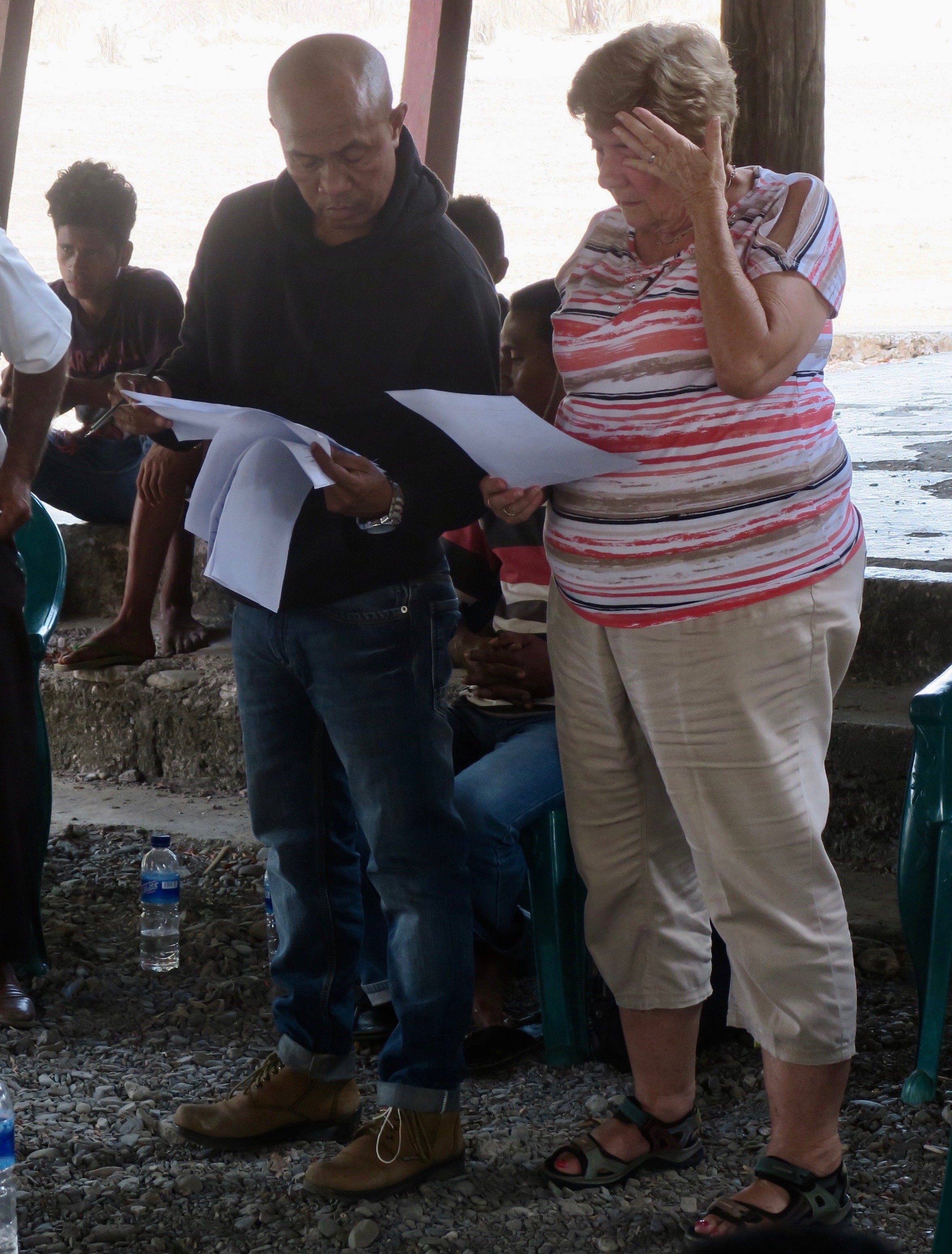
In Oecusse in 2003
Newport's David Catchlove shares a few insights:
I first heard Judy’s story at a dinner party, during which I remained riveted as her story unfolded.
It seems Judy spent most of her working life as a science teacher, which is how I happened to be at said dinner party, since my wife had taught with her at Cromer High School years ago. On leaving teaching at a relatively young age and feeling there was much left undone in her life, Judy volunteered to spend 5 months in East Timor setting up an environmental program for OzGREEN, an Australian NGO. This was not long after Indonesia had vacated East Timor after 25 years of despotic rule, leaving the place a blighted wasteland.
Judy certainly did not realise that an extraordinary 19 years in East Timor would follow. At the beginning of her initial 5 months stint in 2001, she was helicoptered into Oecusse, a remote East Timorese enclave, surrounded by Indonesian West Timor. Judy describes the scene of destruction and chaos left by the departing Indonesians. Buildings that had been sprayed with kerosene and burnt to the ground. Homes and all services destroyed. Men, women and children in a state of shock, their vacant eyes revealing the horror they had been through.
Nevertheless, Judy set up home in Oecusse, in a destroyed house with appalling sanitation, polluted water and almost no electricity. For most of us, 5 months in such a hell-hole would be more than enough, but the experience was utterly mind-altering for Judy and she felt she had to return. So affected by the contrast between her own country and Timor, she describes how she entered a Woolworths supermarket on her return to Australia.
“I stood at the entrance to the supermarket but I couldn’t enter. Those overflowing shelves, seeing food en masse in that way compared with the horrendous existence of our near neighbours in East Timor – it just made me break down and cry. “
Within a couple of months Judy was back in East Timor, in the same house in Oecusse. Over the following years, her attitude to the local Timorese has become one of profound respect and admiration. This is the third poorest country in the world after Yemen and Afghanistan, yet the people show determination and spirit, a warmth and generosity that has kept her coming back to East Timor.
She is now known locally as “Mrs Judy”. She has accomplished something that all the money of many NGO’s and foreign government bodies have often failed to accomplish, and that is, an effective dialogue with local people that has materially helped them without at any time letting them down. She has persisted year after year, solidifying her relationships and connections.
While Judy’s work is many faceted, she concentrates on two basic areas. The first is to improve the quality of the water supply in remote hillside villages and the second is to foster community cohesion particularly in regards to young people, through the development of sporting activities in the region.
She brings her scientific background to Timor’s unclean water problems. Judy talks about her approach as follows:
“When Luis and I get to a new village, we talk with the locals about their village. Fortunately, I’ve been able to improve Luis’ English, and he’s taught me Tetum, the local language. We talk at length about their hopes and aspirations and what would help them. Most importantly, we ask them what they would want, and don’t try to push onto them our formula for improvement. (Luis is a local Timorese who is the Director of the NGO Judy set up in Oecusse)
“Invariably the water supply is an issue. As far as that’s concerned, we aim to install a water filtering system in each family’s house. I’ve studied sustainable water filter systems at length, looking at many models throughout the third world. By a happy co-incidence, our system appeals to local people because it is a sand filter that is cheap, easy to maintain and accords with local animism beliefs. You have to take any advantage on offer!”
In fact, Judy professes a strong affinity with animism, the view that animals, plants and the earth itself possess a spiritual quality. “It’s a connection with the landscape and these wonderful people I’ve begun to feel more and more the longer I stay here”, she says.
The regional annual sporting “Green Games”, is a sort of mini Oecusse Olympics set up by Judy, her staff and local volunteers and has gone a long way to enhancing community cohesion. There is much training and preparation for the events, held as soon as the wet season is over. “It boosts the confidence of our young people,” says Judy, “it costs us very little to put on with everyone pitching in and it is such fun.”
On her return trips to Australia, Judy is amazed that Australians know so little about this beautiful, but hopelessly flawed and poverty ridden neighbour less than 500 Km to our north. Australians also know very little about Judy Charnaud who, living in the simplest of conditions, has shown an amazing degree of altruism, resourcefulness, empathy, intelligence and practicality.
Surely a great Australian.
Timor Leste June 2019 Newsletter: OzGREEN
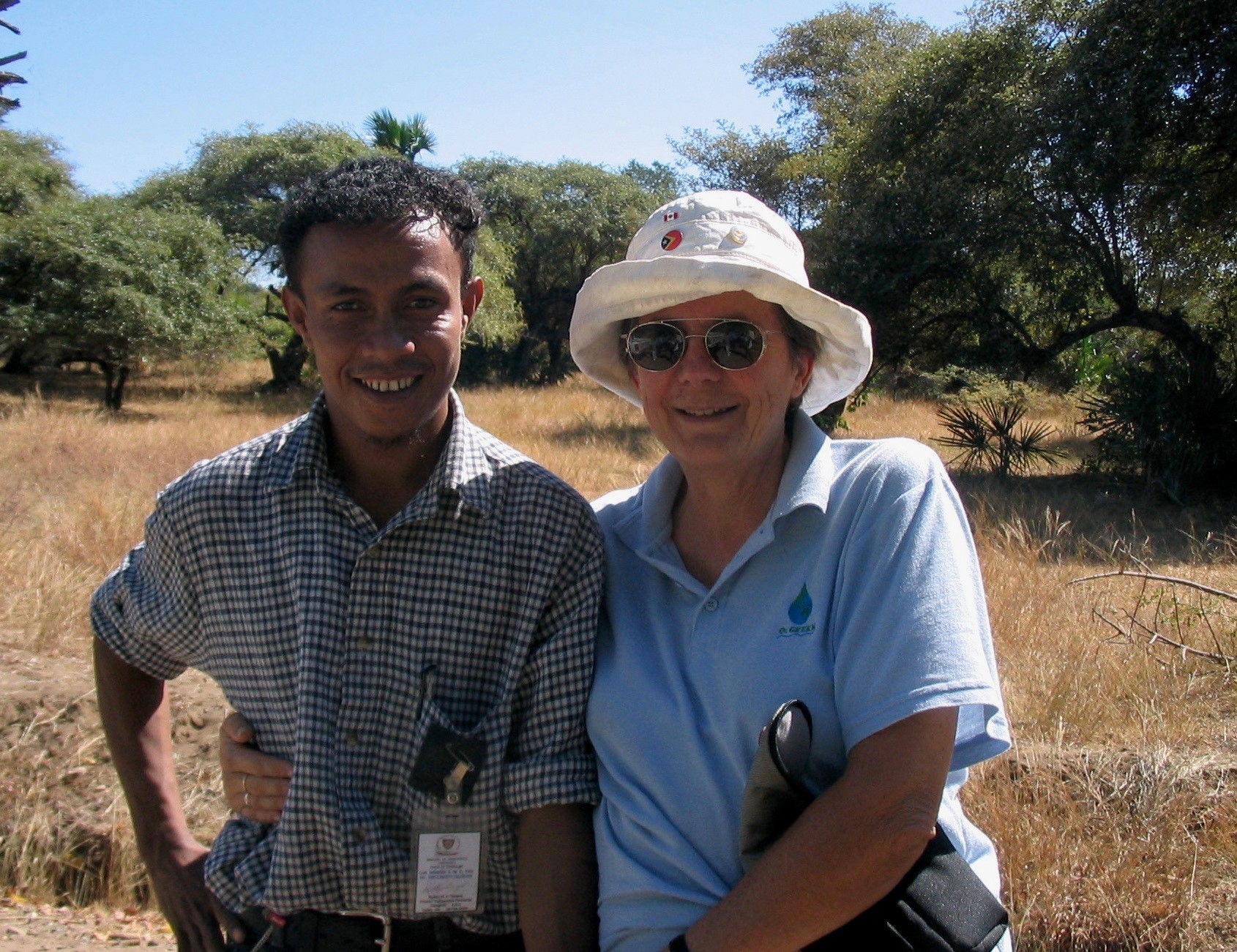
Judy and Luis Armando who runs the NGO in Oecusse in 2018
“Sometimes we have to do things that are not easy.”
I should know by now that when Luis says things are OK it is not necessarily so! When we visited Lifau, the site he had chosen this year for the Youth-in-Action GREEN Games, to check out the soccer field and volley ball court, I asked the question “Why did you choose Lifau for the games this year?” His reply heads this newsletter. The “OK” soccer field I saw was an open paddock, covered in patchy grass, dirt and buffalo pats and with several swampy bog holes in it! The goal posts, wonky bits of wood that were on the verge of falling down. I suppose I should be grateful as it is not the rocks as in Pune or dirt as in Boaknana. Luis assured me that the locals use this field every day – no doubt they do but for grazing their buffalo and pigs not for playing soccer.
The volley ball court did not exist but there was a flattish piece of ground in the paddock, covered mainly in grass on which the court could be built! I don’t think Luis realised the irony of his statement – being here is not easy, how the people live here is not easy, how Luis copes with all that comes into his daily life cannot be easy! So here we go – get on with turning a paddock into a sporting arena! At least the community is keen, energetic and prepared to get on and do just that!
“We are very proud to have this opportunity – we have never had any such thing in Lifau before.” (Miguel, a community member)
So over three weeks Luis and his team measured, flattened, dug, made goal posts from purloined telegraph poles, cut, welded, painted, carried sand and rocks, filled in holes, marked out white lines with local chalk, built a shelter and seats and lo and behold we have a useable soccer field and volley ball court! Well done guys what a great community effort!
Youth-in-Action GREEN Games, Pumps, Bio-sand Filtration Units.
I could talk about all these things:
The Games: are going well – 27 soccer teams playing their hearts out and thoroughly enjoying the opportunity the Games give them. We have 24 volley ball teams enlisted, 13 men and 11 women. Then my favourite, because it is a laugh a minute, the dada-tali (tug-of-war).
Pumps: We have put two more pumps in place, one in the Clinic and Community Centre in Lifau and another in the house of the man who has given us permission to use his land for the Games. He is a local leader and owns most of the community land in the village.
Bio-sand Filtration Units: GREEN TL has put in place two more bio-sand filtration units – one in Boaknana where one of my ex workers now lives. Lafau was one of the original members of GREENTL and still comes all the way from Boaknana to help us now and then. He is currently helping with these Games as he has done for the last 12! We have put another BSF in Lifau and have five more ready to go!
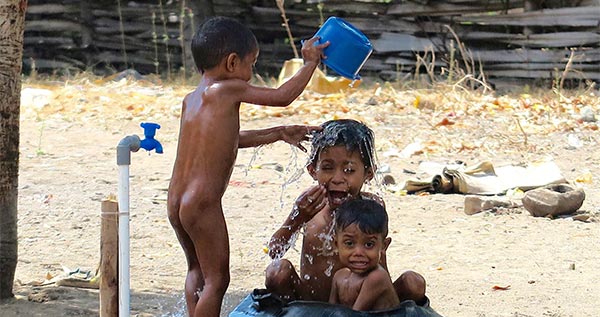
However instead of going into all that, because you have read it all before, I thought it might be interesting if I answered the following question I have often been asked:
What is your typical day in Oecusse?
There really is no such thing as a typical day so just as an example I will copy here my diary entry for 3rd June 2019. Such an interesting day I was slightly more loquacious than usual. “The neighbours are away at the moment – up in their home village sacrificing a pig or two because someone is sick. Because they are away I get to sleep in until 7.30, usually I have to get up earlier because the girl next door washes my dishes and “cleans” the house before she goes to school. Off for my morning swim, collecting the bread from the back porch before I go. Miguel is earlier than me this morning so the bread is hanging in a plastic bag from a nail up high on a pole to stop the dogs getting at it before I do!
Decide against a swim because the sea is quite rough, not by Sydney standards but by Oecusse standards. The problem here is that the sea bed dips down very suddenly near shore so within a few metres it is well over head height. No swim is a bad start to the day! Then have to wash my dishes as they have not been done for several days. This involves carrying the washing bowl outside as there is no water inside and no space to wash dishes anyway. There is a barrel half full of water on the back porch. We have not had water to the house for quite some time now – broken pipes or some other excuse. My tea mugs are so stained that it is disgusting even looking at them let alone drinking out of them, so I decide on the well-known camping remedy – scrub them out with sand! Worked well except that the sand in my garden is actually dirt so my washing up water got filthy very quickly, tip that lot out and get more from my rapidly diminishing supply.
Several of the local dogs are on my back porch, I have discovered that they like to drink the washing up water as it has some food scraps in it. These are very unpleasant dogs – scrawny, sick and they bark all night so get no respect from me! Ok dishes washed and put away so now time for my wash. This interesting daily affair involves standing in the “mandie” a very small bathroom with a tiled tank, a toilet and not much else and throwing guyuns (small washing buckets) of water all over myself and of course the walls and the floor! I hang my towel on a nail high up on the door so it does not get too wet during this process. The problem today though is that I have very little water in the tub and what is there is dirty as it contains the dirt and leaves which have sunk to the bottom. I have to somehow wash my hair as it is like straw after being in the dirt and dust all day, more on that later, and nothing but sea water in it for a few days. Decide that I had better put my swimming costume back on and wash myself outside as there is some water out there and I am sick and tired of lugging buckets of water into the house. So here I am in my swimming costume which is a sight to behold – I bought it up here many years ago and wear it each day for my swim. Bowing to decency I wear a pair of board shorts over it when I go down the road to the beach. The costume has perished to the extent that it has lost all elasticity, the straps are knotted together so the top does not fall down and cockroaches or mice have eaten many holes in it. Why don’t I throw this one out – not quite sure! So here I am daggy, baggy, wrinkled me in my daggy, baggy, wrinkled swimming costume, hair covered in shampoo suds out on the back porch tossing buckets of water over myself in full view of an ancient old guy staring over the back fence. Probably thinks the malae has gone mad at last! After that exercise I carefully walk back inside dripping water on the tiles and trying hard not to slip over on them! Now clean and dressed it is breakfast time. Tea, papaya, lemon and two small, quite decent bread rolls which are baked over an open fire each morning by a lady in Pademou and delivered to me by Miguel at the grand price of 10 cents each. Then it is time to try the internet – I went to the expense of buying a router and now theoretically have wifi to the house! Try to read the SMH - a page, a stop, another page!
After that frustration I start working on reports before the next big activity for today – Luis and co arrive in the car with barrels of water – so after lots of carrying in and out I now have a mandie, and a large garbage bin, plus a barrel outside of good clean water, not drinkable but it looks clean enough to wash in! Luis then decides he needs to have a rest so I drop him back home and take the car to do some shopping – water, milk, biscuits, tea, then back home to work on the computer and have lunch. After lunch it is siesta time, don’t forget I have been up here for almost 6 weeks and am constantly tired! I am disturbed in this siesta by Goris and Liam who have come to collect my dirty clothes for Sela to wash as they have plenty of water at their place. Have to watch Goris fix his bike – clean the spark plugs before he can leave, and of course he tells me it will cost him $45 to fix? Wonder if he is suggesting something? Next step off to collect Luis to go to Lifau for the afternoon soccer games. It is only a 30 minute or so trip over a good road part of the way and once across the bridge a really bad road for the rest! Bump, grind, toss and turn – my joints don’t react well to this. I wedge myself into the front seat with a few pillows to at least try and stop some of the tossing around!
The games are going well with full support from the community. The problem is the wind – never have I known Oecusse to be so windy for so long and never at this time of the year. Every day the wind howls across the soccer field blowing dust, twigs and leaves so by the end of the day everything is covered in a fine layer of grit which gets into very available nook and cranny. The committee, who don’t seem to mind the heat, are rugged up in long sleeved shirts, scarves tied over their faces and hats pulled down over their eyes! I just have to sit and bear it – heat, dust, leaves, screaming children, yelling supporters, whistles and trumpets! Am I enjoying it – I’m sure I will once the wind stops.
Several hours later, covered in grime, we leave Lifau to return home. It is about 6.00 by the time the games have finished and the committee have retrieved the flags, nets, balls, rope from around the field. Same trip in reverse back home – I am always relieved when we get back to the bridge across the Tono R. as I have survived yet another day of bad roads.
Arrive home just before 7 pm. My neighbours have returned and there is a lot of noise going on – turns out that one of the local dogs has been run over by the truck which brought Merci home from the mountains, this is just one of the many dogs in the neighbourhood so I am not upset that one has been killed. In fact I reckon that most of the dogs up here lie on the road in the hope that they will get run over as their life is dreadful, not enough food, (to the extent that they fight for the right to drink my washing up water), too many puppies, living in dirty and uncomfortable places and if they look slightly healthy there is a fair chance they will become the next meal for their human owners!
This death meant that children were screaming, Rosa was yelling at the truck owner and the still living dogs were howling and barking! In the midst of all this I am asked to dinner at Merci’s as she has bought some of the pig meat back from the mountains. I accept this invitation with gratitude. Rice, fatty pork and green vegetables – not too bad, it is filling and I do not have to cook. By this time it is 8.30, the dogs are still howling and barking and I am too exhausted to do any more! After trying to use the computer I get so sick of the noise the dogs are making that I go outside to throw stones and yell at them. Seems to work for a while at least but had to repeat the performance half an hour later which met with much greater success. Then time to splash buckets of water over myself, clean my teeth, scrub my filthy feet and fall into bed in an exhausted, hot heap!”
So that is a typical day in Oecusse!
Every day is not exactly the same, different problems, different noises, different arguments but all in all today describes it best. I defy anyone to come and live up here and cope with all this. I guess I have got used to it and now look on things more like a local rather than as a foreigner! I must admit I love going back home to my clean house in Sydney, no dust, no noise, water at the turn of a tap and a clean bed, in fact I think that is what keeps me going – I know I can get out whenever I want to!
Please Help if you can.
Once again I am asking if you have any spare cash at all please donate to this Oecusse project. There is so much poverty up here, that it breaks my heart, things are getting worse rather than better. Families scrimping and saving to send their children to school in the hope that they might have a brighter future, women working very hard all day looking after family and then staying up all night to cook small bread rolls to sell for 10 cents each, just to get some rice on the table, children walking miles in worn out, broken shoes to get to school, my neighbours begging me to buy their woven tais which I cannot afford to keep on doing, families living in shanties which should not even be called liveable, too many people, babies, the young and old dying of preventable diseases because they are too malnourished to survive and so it goes on.
Please make a donation to help these worthy, needy people. GREEN TL can then distribute more bio-sand filtration units, provide pumps and piping for irrigating community vegetable gardens, give chickens and piglets to needy families and provide assistance for children to attend school.
Donations over $2 to the Sustainable Villages project are tax deductible: Donate online by going to the Rotary Australia World Community Service, (RAWCS) website. https://donations.rawcs.com.au/Default.aspx?ProjectID=592&ReturnTo=4
If this connection does not work simply hit the donate now button and search for project number 50 years 11/12. (Sustainable Villages Oecusse).
Or via OzGREEN: https://ozgreen.nationbuilder.com/east_timor_donation
